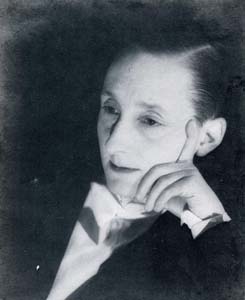Marlow Moss facts for kids
Quick facts for kids
Marjorie Jewel "Marlow" Moss
|
|
|---|---|
 |
|
| Born |
Marjorie Jewel Moss
29 May 1889 Kilburn, London
|
| Died | 23 August 1958 (aged 69) Penzance, Cornwall
|
| Nationality | British |
| Education | St John's Wood Art School, Slade School of Fine Art, Académie Moderne |
| Known for | Painting |
| Movement | Constructivism |
| Partner(s) | Antoinette Hendrika Nijhoff-Wind |
Marjorie Jewel "Marlow" Moss (born May 29, 1889 – died August 23, 1958) was a talented British artist. She was known for her unique style called Constructivism, which focused on simple shapes and straight lines. Marlow Moss created many interesting paintings and sculptures during her life.
Contents
Biography
Early Life and Art Studies
Marlow Moss was born on May 29, 1889, in Kilburn, a part of London. Her parents were Lionel and Fannie Moss. As a child, she loved music very much. However, her music studies were stopped for several years because she became ill with tuberculosis.
Later, Moss became interested in ballet. Around 1919, she decided to change her first name from Marjorie to Marlow. She also moved to Cornwall to live alone and focus on her art.
Developing Her Style
Marlow Moss studied art at several famous schools. These included St John's Wood Art School and the Slade School of Fine Art. She also learned from well-known artists like Fernand Léger and Amédée Ozenfant at the Académie Moderne in Paris.
Moss became good friends with another famous artist, Piet Mondrian. They both used a special technique called the "double line" in their artwork. They learned from each other and helped each other develop this style.
She was also a founding member of a group called Abstraction-Création. This group was all about abstract art, which uses shapes, colors, and lines instead of realistic pictures. Marlow Moss was the only British artist whose work appeared in all five of the group's yearly art books.
Life in Cornwall
When World War II began, Marlow Moss left France. She moved back to Cornwall, England, and lived near a beautiful place called Lamorna Cove. While there, she even studied architecture at the Penzance School of Art.
For the rest of her life, she lived and worked in Cornwall. She often visited Paris to see art and friends. A neighbor in Lamorna remembered her as a kind person. This neighbor, who was a child at the time, used to peek into Moss's studio. They watched her paint:
... we'd see her pacing up and down, pacing, pacing. And then she would draw a straight line. Her work was all straight lines and cubes. Then she'd pace up and down again and then – uh, a square would be drawn.
This shows how carefully and thoughtfully she created her art, focusing on precise lines and shapes.
Exhibitions and Legacy
Marlow Moss's artwork was shown in several important exhibitions. Erica Brausen organized individual shows of her work at the Hanover Gallery in London in 1953 and 1958. Her art was also displayed at the Stedelijk Museum in Amsterdam in 1962. Another exhibition took place at the Town Hall of Middelburg in 1972.
Marlow Moss passed away on August 23, 1958, in Penzance, Cornwall. Her unique contributions to Constructivism continue to be admired.
Where to See Her Art
Marlow Moss's artworks are held in many important art collections around the world. You can find her pieces in museums like:
- The Israel Museum
- The Stedelijk Museum Amsterdam
- The Kröller-Müller Museum in Otterlo
- The Kunstmuseum Den Haag
- The Museum of Modern Art in New York
- Tate in the UK
See also
 In Spanish: Marlow Moss para niños
In Spanish: Marlow Moss para niños
 | Stephanie Wilson |
 | Charles Bolden |
 | Ronald McNair |
 | Frederick D. Gregory |

